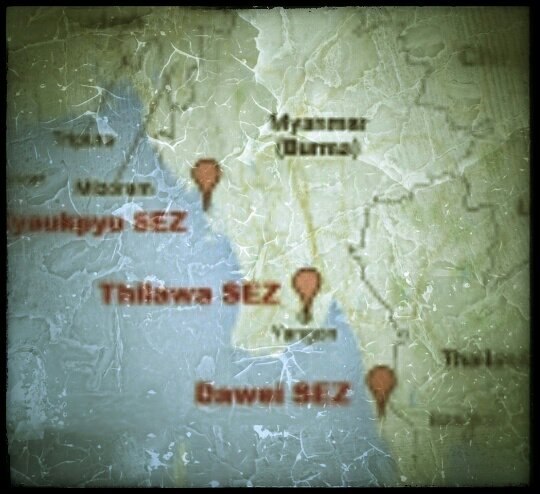لقراءة المقال مترجم إلى العربية انتقل إلى الأسفل
A major part of the equation in Myanmar is almost entirely missing from the discussion; perhaps the primary part of the equation: economics.
It cannot be responsibly regarded as coincidental that the areas of Rakhine in which the worst atrocities have been committed are also areas in which the government has, or plans to have, significant economic development projects. There were massacres in Sittwe in 2012 at the starting point of the Shwe Oil/Gas pipeline to China, and violence connected to the Kyaukphyu Special Economic Zone (SEZ), and now amidst the current military operations the government announced the planned development of a new SEZ in Maungdaw once the situation has “calmed down”. What is meant by “calm” can be easily guessed. It means, “thorough subjugation through violence”.
The Buddhist versus Muslim narrative is superficial at best. As is the official story of the government that they are battling “insurgents”. Yes, the conflict is playing out as a religious and ethnic struggle, and yes, there is a small group of armed Rohingya who claim to be defending their people (though in reality they are doing nothing but provoke reprisals and justify the regime’s repression). But these are little more than the modalities of how a fundamentally economic conflict is being pursued.
There can be no realistic expectation of resolving this matter unless and until the economic motive is addressed. This is going to require activists to begin focusing their attention on private sector players; those who stand to benefit from the repression in Rakhine, and from their collaboration with the central government. Foreign investors and multinational corporations play a decisive role in this conflict, even though their presence is in the background; and even though no one is talking about them.
At the very least, activists and campaigners need to call upon companies invested in Myanmar to publicly condemn the violence and demand a full cessation of military operations immediately. Now, business does not have to respond to activists, but they do have to respond to their customers. This means that we all, each and every one of us, need to deliver a message to those multinationals investing in Myanmar that we will not support their profitability anywhere if they do not support our demands in Rakhine.
If companies begin to see that the government’s policy against the Rohingya is interfering with their business interests, they will apply pressure on the regime to change. But if their business interests remain intact, I’m afraid that nothing else we try to do will succeed in halting the genocide.
هناك شق كبير من المعادلة في ميانمار مفقود بشكل كلي من النقاش الدائر؛ وهذا الجزء ربما يكون هو الجزء الأساسي من المعادلة وهو: الاقتصاد.
لا يمكن عقليا أن نعتبر الأمر صدفة أن تكون منطقة راخين التي ترتكب فيها أسوأ الفظائع هي أيضا نفس المنطقة التي تعتزم الحكومة (أو تخطط) أن تقيم فيها مشاريع هامة للتنمية الاقتصادية. لقد كانت هناك مذابح في سيتوي في عام 2012 عند بداية خط أنابيب النفط والغاز “شوي” الذي ينتهي إلى الصين، ثم امتد العنف حتى وصل المنطقة الاقتصادية الخاصة (SEZ) لكيوكفيو، والآن في ظل العمليات العسكرية الحالية أعلنت الحكومة عن خطتها لتطوير جديد في المنطقة الاقتصادية الخاصة بمونداو (Maungdaw) فور أن “تهدأ” الأمور، وطبعا يمكننا أن نتخيل بسهولة المقصود من “الهدوء” هنا: “الإخضاع الشامل باستخدام العنف”.
السردية البوذية مقابل السردية الإسلامية تعتبر سطحية في أحسن الأحوال، تماما مثل القصة الرسمية للحكومة التي تقاتل “المتمردين”. لا ننكر أن الصراع يأخذ الشكل الديني والعرقي، كما لا ننكر أن هناك مجموعة صغيرة مسلحة من الروهينجا يدعون أنهم يدافعون عن شعبهم (على الرغم من أنهم في الواقع لا يفعلون سوى إثارة الانتقام وتبرير قمع النظام)، ولكن كل هذا ليس إلا طريقة من الطرائق التي يتم بها متابعة أي صراع يكون اقتصادي في جوهري.
لا يمكن أن يكون هناك توقع واقعي لحل هذه المسألة ما لم يتم التصدي للدوافع الاقتصادية. ويتطلب ذلك من الناشطين البدء في تركيز اهتمامهم على الجهات الفاعلة في القطاع الخاص؛ الذين يستفيدون من القمع في راخين، ومن تعاونهم مع الحكومة المركزية. فالمستثمرون الأجانب والشركات متعددة الجنسيات يؤدون دورًا حاسمًا في هذا الصراع، على الرغم من وجودهم في الخلفية؛ وعلى الرغم من أن لا أحد يتحدث عنهم.
فعلى أقل تقدير، يتعين على النشطاء والناشطين أن يطالبوا الشركات المستثمرة في ميانمار أن تدين العنف علنا وأن تطالب بالإيقاف الكامل للعمليات العسكرية فورا. وأصحاب هذه الأعمال من شركات وغيرها، ليسوا في حاجة للتجاوب مع النشطاء إن لم يريدوا، ولكن سيتعين عليهم التجاوب مع عملائهم. وهذا يعني أننا جميعا، أي كل واحد منا، يجب أن يعمل على إيصال رسالة إلى هذه الشركات متعددة الجنسيات التي تستثمر في ميانمار بأننا لن ندعم ربحيتهم في أي مكان إن لم يدعموا مطالبنا في راخين.
إذا بدأت الشركات ترى أن سياسة الحكومة ضد الروهينجا تتداخل مع مصالحها التجارية، فسيضغطون فورا على النظام لتغيير سياسته. ولكن إذا بقيت مصالحهم التجارية سليمة، أخشى ألا ينجح أي شيء آخر نحاول القيام به في إيقاف الإبادة الجماعية.

